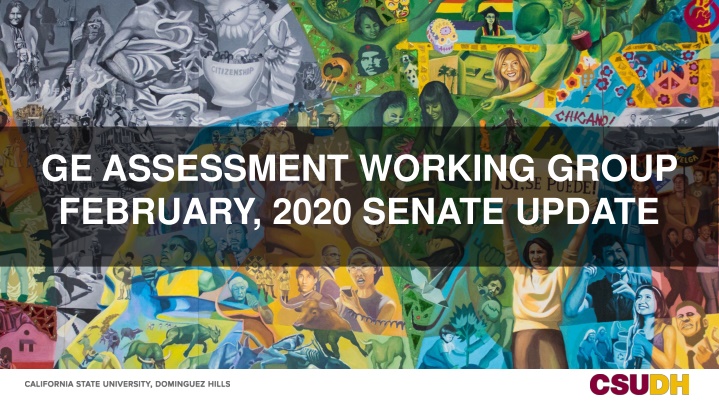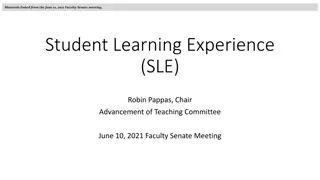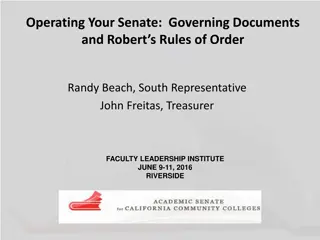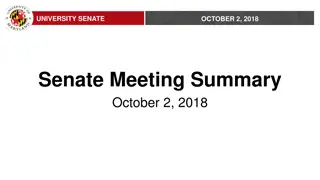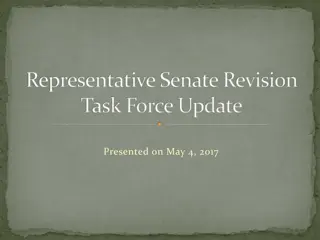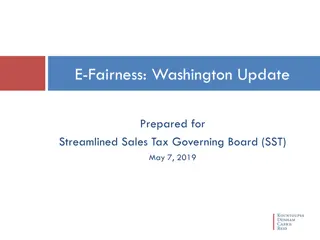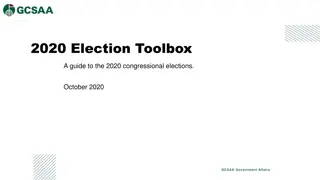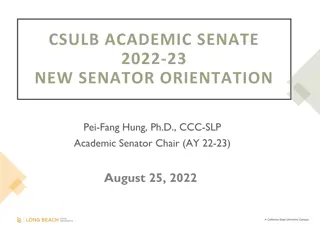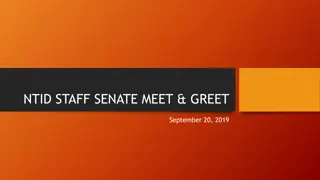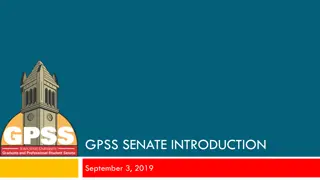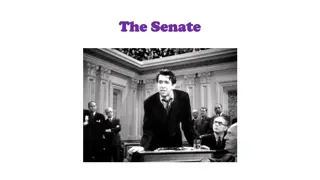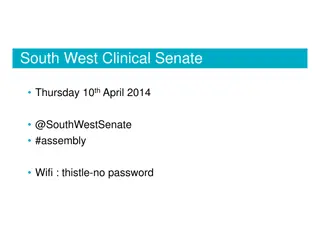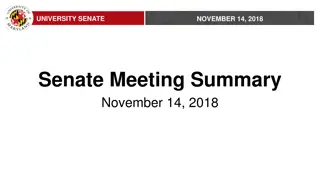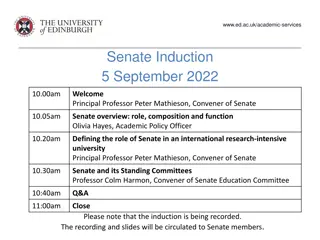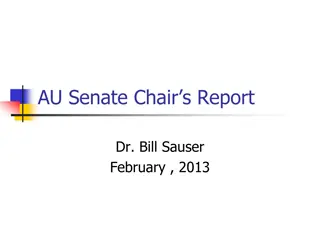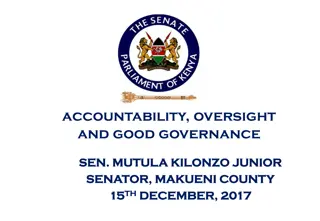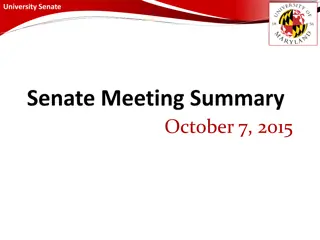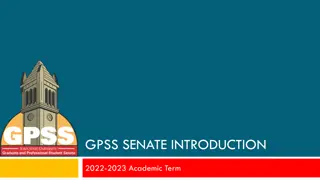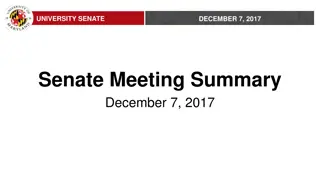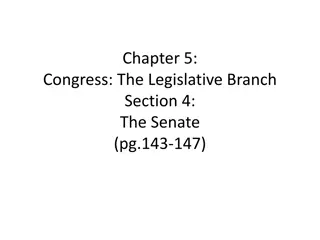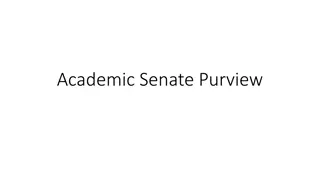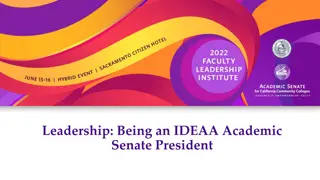GE Assessment Working Group Update - February 2020 Senate Update
The GE Assessment Working Group at CSUDH aims to improve the General Education program by enhancing students' experiences of a liberal education. The group, consisting of dedicated members, is tasked with updating and assessing the GE structure, incorporating feedback from campus-wide discussions, and considering the implications of AB 1460 on incorporating an Ethnic Studies requirement. Guided by values of equity, student perspectives, and academic freedom, the group is committed to strengthening the GE curriculum with intentionality and coherence.
Download Presentation

Please find below an Image/Link to download the presentation.
The content on the website is provided AS IS for your information and personal use only. It may not be sold, licensed, or shared on other websites without obtaining consent from the author.If you encounter any issues during the download, it is possible that the publisher has removed the file from their server.
You are allowed to download the files provided on this website for personal or commercial use, subject to the condition that they are used lawfully. All files are the property of their respective owners.
The content on the website is provided AS IS for your information and personal use only. It may not be sold, licensed, or shared on other websites without obtaining consent from the author.
E N D
Presentation Transcript
SUBTITLE GOES HERE GE ASSESSMENT WORKING GROUP FEBRUARY, 2020 SENATE UPDATE
WORKING GROUP MEMBERS SUBTITLE GOES HERE Co-Facilitators Kim Costino, Dean, Undergraduate Studies Pat Kalayjian, Chair, G. E. Committee Matt G. Mutchler, Faculty Director of Assessment Summer/AY Members Toumik Asaatorian, Student Affairs Marisela Ch vez, Chicana/o Studies Anne Choi, Interdisciplinary Studies Susan D. Einbinder, Social Work Carolyn Caffrey Gardner, University Library Mara Lee Grayson, English Angela Macias, Liberal Studies Alexandra Park, Psychology Hal Weary, Music Summer Only Members: Siskanna Naynaha, English/WAC Director Sue Needham, Anthropology AY Only Members: Mark Carrier, Psychology Maggie Clarke, University Library Salvatore Russo, Political Science Sarah Taylor, Anthropology
GENERAL EDUCATION SUBTITLE GOES HERE The Association of American Colleges and Universities (2019) defines a liberal education as: an approach to learning that empowers individuals and prepares them to deal with complexity, diversity, and change. It provides students with broad knowledge of the wider world (e.g., science, culture, and society) as well as in-depth study in a specific area of interest. A liberal education helps student develop a sense of social responsibility, as well as strong and transferable intellectual and practical skills such as communication, analytical and problem-solving skills, and a demonstrated ability to apply knowledge and skills in real-world settings. This definition is consistent with GE and our aim in assessment is simply to improve our GE program, and thus, our students experiences of a liberal education at CSUDH. As stated by Kuh (2014, page 235), the importance of assessment also cannot be over-stated, The quality of life in communities, economic competitiveness, the health of the democracy, and society s capacity to innovate, create, and complete all rest on high quality educational outcomes.
GEAWG CHARGE SUBTITLE GOES HERE To complete two tasks by the end of this academic year: Consider if/how the goals of what used to be known as Area G: Cultural Pluralism should be updated, defined, integrated, and assessed as part of our GE structure; and Make a recommendation, informed by campus-wide feedback (including at least two Town Halls), to the Academic Senate for a meaningful, implementable plan to assess GE, as a program, including the above, on an on-going basis. Since the call for participants went out and the Group began its work, the Academic Senate has also asked the Working Group to consider the substance of AB 1460 in its deliberations and conversations, how we, as a campus, want to incorporate an Ethnic Studies requirement.
VALUES & GUIDING PRINCIPLES SUBTITLE GOES HERE Bring an equity lens to all that we do. Student needs, voices, and perspectives matter. Disciplinary expertise must be respected, but balanced by an effort to keep GE open to as many faculty and fields as possible; this is not about kicking anyone out of GE, but about creating coherence and intentionality within the GE curriculum. Academic freedom must be respected. The GE program should reflect students identities, strengths, and values. The GE program should integrate the PLOs at all levels and across the curriculum. Adhere to AAHE s 9 principles of good assessment practice.
PROCESS & MECHANISMS FOR FEEDBACK SUBTITLE GOES HERE Spring 19 Academic Senate Retreat Discussion of Area G Student Focus Groups (Spring 19, 53 participants) Spring 19 Town Hall (April 17, 2019, 33 participants, info posted online for comment until June 2019) GEAWG Summer 19 Three-Day Retreat in June & 5 Fall 19 Meetings Fall 19 Academic Senate Retreat Discussion of Area G GELOs #5 & #7 Community Engagement FLC Discussion of GELO #8 Consultation with GE Committee re: all GELOs Fall 19 Town Hall (December 6, 2019, 42 participants, info posted online and available for comment until January 30, 2020)
THEMES FROM STUDENT FOCUS GROUPS SUBTITLE GOES HERE Positive Helps you be well-rounded and expand what you know Provides a good foundation for other coursework Transitions you into the university Not so positive Feels just like high school Not connected to anything; just feels like a bunch of unrelated courses you have to take to graduate Not connected to me or the real world in any way
TAKE-AWAYS FROM THE SPRING 19 TOWN HALL SUBTITLE GOES HERE We need to find a way to bring coherence to GE, so it actually functions like a unified, integrated program that is meaningful. We still have too many outcomes. We need more faculty development. We need smaller classes. The term cultural pluralism is dated; it needs to be updated by faculty with disciplinary expertise. A smaller number of outcomes (but ones that include an updated version of cultural pluralism) needs to be integrated throughout the program.
DRAFT GE LEARNING OUTCOMES (GELOS) SUBTITLE GOES HERE 1. Metacognition (ILO 1,3, 5) 2. Critical Inquiry (ILO 1, 4, 5) 3. Communication: (ILO 2, 4, 5) 4. Information Literacy (ILO 3, 4) 5. Race, Equity and Social Justice (ILO 5, 1, 3) 6. Integrative Learning (ILO 1-5) 7. Global Awareness (ILO 5, 1) 8. Community Engagement (ILO 1, 5)
WHERE IS AREA G IN THESE GELOS? SUBTITLE GOES HERE Race, Equity and Social Justice (#5): Examine intersectional factors including, but not limited to, class, gender, race, and sexualities in order to understand the social, historical, and differential impact of racism, oppression, and social inequality in the United States Global Awareness and Diversity (#7): Analyze and appreciate the cultural, social and political implications and manifestations of global interconnections and dynamics
WHAT WILL WE DO WITH THESE GELOS? SUBTITLE GOES HERE In the process of looking at all current GE syllabi to see where each GELO is addressed/reflected and to see if some of them naturally land or appear in particular categories, if there are patterns. (Curriculum Mapping) The ultimate goal is to figure out a way to align each outcome to at least two Areas/Categories of GE, across disciplines and levels, so that each outcome is intentionally addressed at least twice.
HOW DOES THIS RELATE TO AB 1460? SUBTITLE GOES HERE We have been considering how integrating an updated version of Area G: cultural pluralism would address the substance of AB 1460: what is the relationship between an Ethnic Studies requirement and the ways we are proposing to integrate and assess the Area formerly known as G? We think in many ways that GELO #5 in many ways addresses the substance of the bill by integrating an Ethnic Studies perspective and a U.S. focus, but we discussed three additional options at the Town Hall in December.
GELO #5 (DRAFT) SUBTITLE GOES HERE Race, Equity and Social Justice: Examine intersectional factors including, but not limited to, class, gender, race, and sexualities in order to understand the social, historical, and differential impact of racism, oppression, and social inequality in the United States
OPTIONS FOR ADDRESSING AB 1460 PRESENTED AT FALL TOWN HALL SUBTITLE GOES HERE Option 1: Require students to take an Ethnic Studies course in AFS, APP & CHS as part of their GE course work. (The CAH Chairs Resolution) Option 2: Make an Ethnic Studies course in AFS, APP & CHS a graduation requirement that can be fulfilled through GE, the major, or with an elective. Option 3: Create an Ethnic Studies designation. Courses would be approved for this designation through a committee analogous to the University Writing Committee. A course with this designation would be required for graduation. The graduation requirement would then be fulfilled within the major, through GE, or as an elective.
TAKE-AWAYS FROM THE FALL 19 TOWN HALL SUBTITLE GOES HERE General satisfaction with the list of 8 outcomes, though they need to be refined. Support for faculty development must be included in GEAWG s recommendations. Interest in an Ethnic Studies requirement, fulfilled in GE or the major, but it must include Native American Studies, so requirement cannot be housed in/defined by department. Support for creating an Ethnic Studies designation, in addition to GELO #5, that articulates student learning outcomes from the lens of Ethnic Studies (something analogous to the Writing Intensive course designation that is governed by the University Writing Committee) that would be governed by a standing committee of the Senate that is chaired by a faculty member with expertise in Ethnic Studies.
NEXT STEPS SUBTITLE GOES HERE Finish mapping the new GELOs onto existing GE Areas/Courses Refine details of a faculty learning community model of assessment of GE as a program; Develop a proposed budget that would support this model; Propose a Faculty Director of GE; Consult with GE Committee and EPC on this work; Spring 20 Town Hall; and Submit final recommendations to Senate by end of the academic year.
